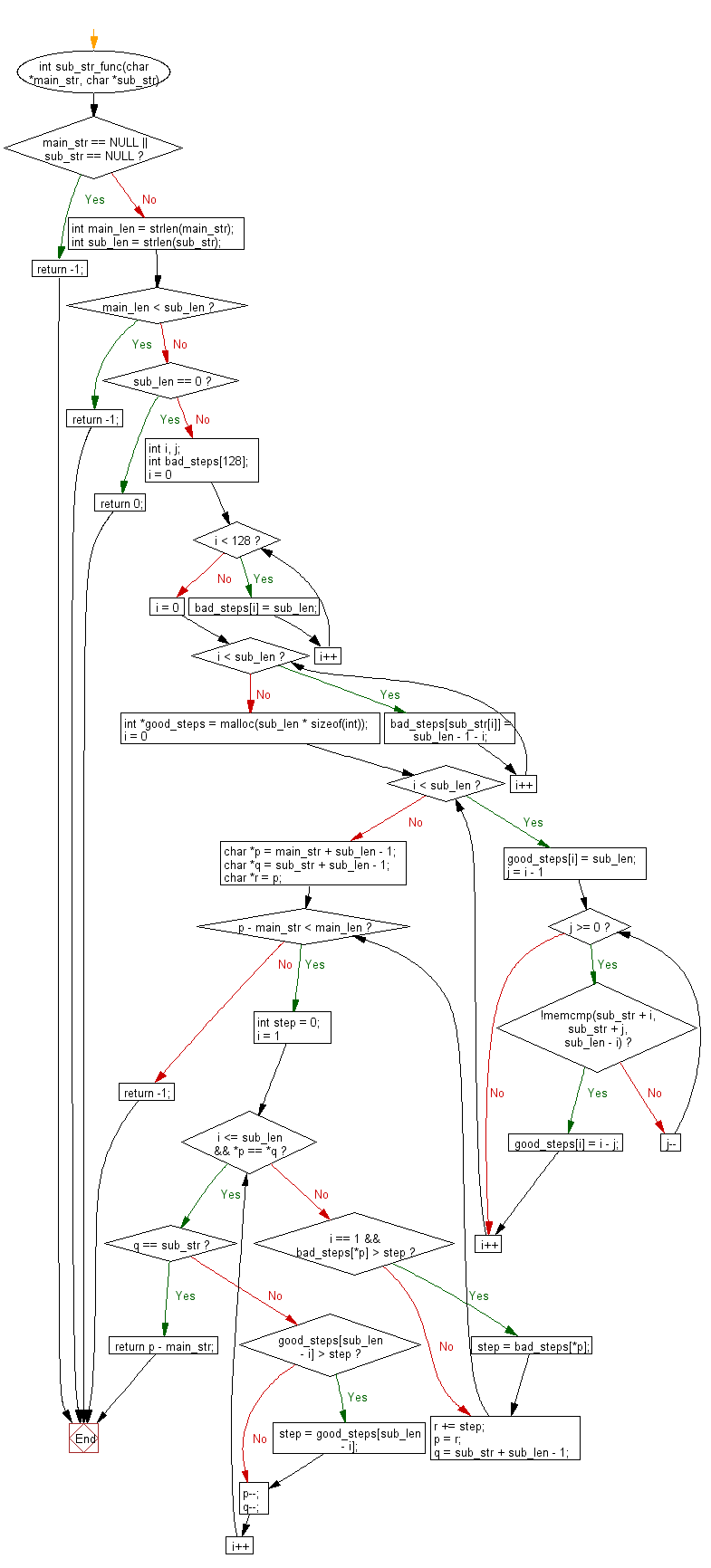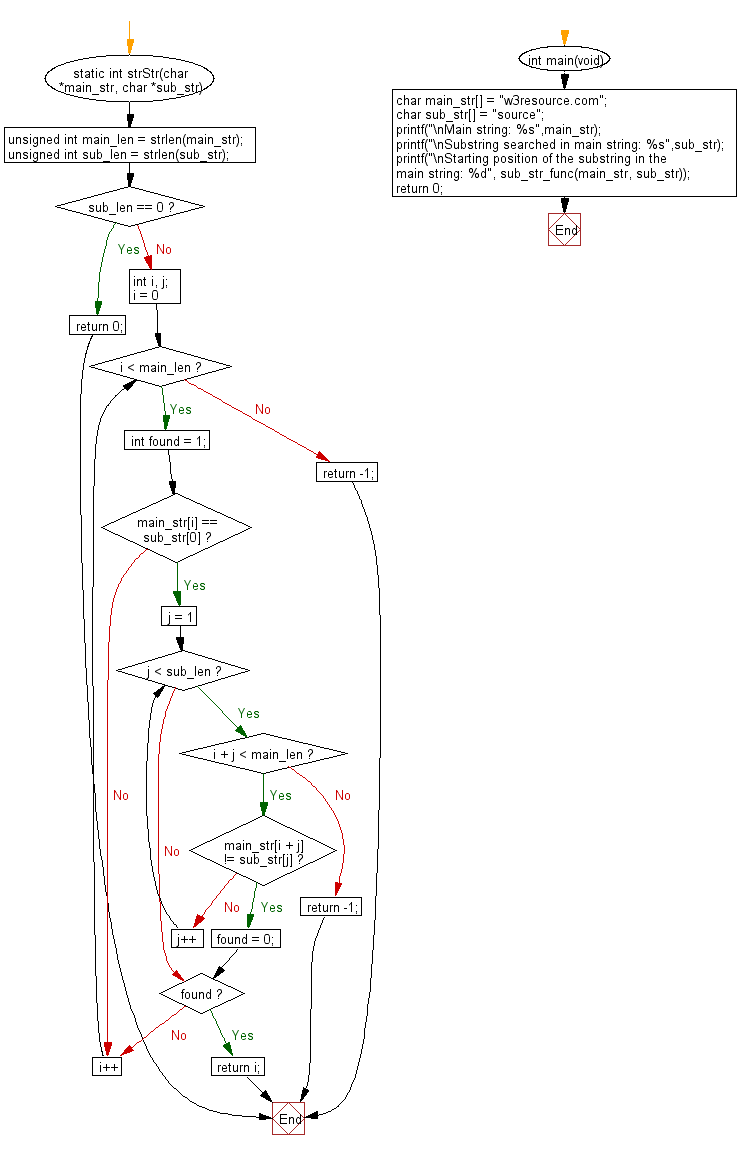C Exercises: Find the index of the first occurrence of a given string within another given string
C Programming Practice: Exercise-14 with Solution
Write a C programming to find the index of the first occurrence of a given string within another given string. If not found return -1.
C Code:
#include <stdio.h>
#include <stdlib.h>
#include <string.h>
int sub_str_func(char *main_str, char *sub_str)
{
if (main_str == NULL || sub_str == NULL) {
return -1;
}
int main_len = strlen(main_str);
int sub_len = strlen(sub_str);
if (main_len < sub_len) {
return -1;
}
if (sub_len == 0) {
return 0;
}
int i, j;
int bad_steps[128];
for (i = 0; i < 128; i++) {
bad_steps[i] = sub_len;
}
for (i = 0; i < sub_len; i++) {
bad_steps[sub_str[i]] = sub_len - 1 - i;
}
int *good_steps = malloc(sub_len * sizeof(int));
for (i = 0; i < sub_len; i++) {
good_steps[i] = sub_len;
for (j = i - 1; j >= 0; j--) {
if (!memcmp(sub_str + i, sub_str + j, sub_len - i)) {
good_steps[i] = i - j;
break;
}
}
}
char *p = main_str + sub_len - 1;
char *q = sub_str + sub_len - 1;
char *r = p;
while (p - main_str < main_len) {
int step = 0;
for (i = 1; i <= sub_len && *p == *q; i++) {
if (q == sub_str) {
return p - main_str;
}
if (good_steps[sub_len - i] > step) {
step = good_steps[sub_len - i];
}
p--;
q--;
}
if (i == 1 && bad_steps[*p] > step) {
step = bad_steps[*p];
}
r += step;
p = r;
q = sub_str + sub_len - 1;
}
return -1;
}
static int strStr(char *main_str, char *sub_str)
{
unsigned int main_len = strlen(main_str);
unsigned int sub_len = strlen(sub_str);
if (sub_len == 0) {
return 0;
}
int i, j;
for (i = 0; i < main_len; i++) {
int found = 1;
if (main_str[i] == sub_str[0]) {
for (j = 1; j < sub_len; j++) {
if (i + j < main_len) {
if (main_str[i + j] != sub_str[j]) {
found = 0;
break;
}
} else {
return -1;
}
}
if (found) {
return i;
}
}
}
return -1;
}
int main(void)
{
char main_str[] = "w3resource.com";
char sub_str[] = "source";
printf("\nMain string: %s",main_str);
printf("\nSubstring searched in main string: %s",sub_str);
printf("\nStarting position of the substring in the main string: %d", sub_str_func(main_str, sub_str));
return 0;
}
Sample Output:
Main string: w3resource.com Substring searched in main string: source Starting position of the substring in the main string: 4
Pictorial Presentation:
Flowchart: 1

Flowchart: 2

C Programming Code Editor:
Contribute your code and comments through Disqus.
Previous: Write a C programming to remove all instances of a given value in a given array of integers and return the length of the new array.
Next: Write a C programming to divide two given integers without using multiplication, division and mod operator. Return the quotient after dividing.
What is the difficulty level of this exercise?
Test your Programming skills with w3resource's quiz.
C Programming: Tips of the Day
Static variable inside of a function in C
The scope of variable is where the variable name can be seen. Here, x is visible only inside function foo().
The lifetime of a variable is the period over which it exists. If x were defined without the keyword static, the lifetime would be from the entry into foo() to the return from foo(); so it would be re-initialized to 5 on every call.
The keyword static acts to extend the lifetime of a variable to the lifetime of the programme; e.g. initialization occurs once and once only and then the variable retains its value - whatever it has come to be - over all future calls to foo().
Ref : https://bit.ly/3fOq7XP
- New Content published on w3resource:
- HTML-CSS Practical: Exercises, Practice, Solution
- Java Regular Expression: Exercises, Practice, Solution
- Scala Programming Exercises, Practice, Solution
- Python Itertools exercises
- Python Numpy exercises
- Python GeoPy Package exercises
- Python Pandas exercises
- Python nltk exercises
- Python BeautifulSoup exercises
- Form Template
- Composer - PHP Package Manager
- PHPUnit - PHP Testing
- Laravel - PHP Framework
- Angular - JavaScript Framework
- Vue - JavaScript Framework
- Jest - JavaScript Testing Framework
